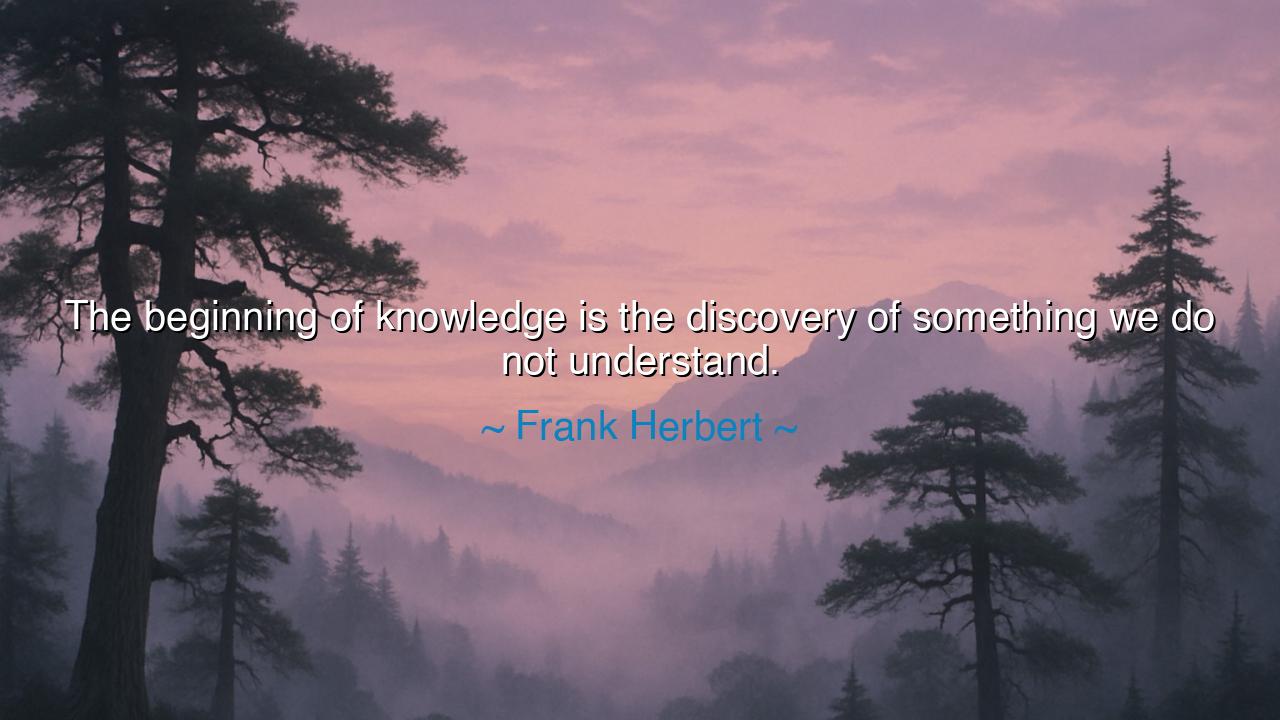
The beginning of knowledge is the discovery of something we do






Hear the words of Frank Herbert, the great weaver of worlds, who declared: “The beginning of knowledge is the discovery of something we do not understand.” This is not merely a saying of intellect, but a truth carved into the bones of human history. For the road to wisdom does not begin with certainty, but with wonder. It begins not when we think we know, but when we stand bewildered before the unknown and dare to ask: What is this? In the trembling of that question lies the seed of all progress.
To confess, “I do not understand,” is no weakness—it is the first act of courage. The arrogant who believe they already know turn away from discovery; the humble who admit ignorance open the door to revelation. Thus Herbert reminds us that knowledge is not a finished temple, but a journey of unending construction. Its cornerstone is always the same: the shock of encountering mystery, the ache of confusion, the restless hunger to seek what hides beyond the veil.
Consider the tale of Isaac Newton, who sat beneath an apple tree and wondered why the fruit fell downward instead of upward. The world had seen apples fall for countless generations, yet none had stopped to question it deeply enough. In that simple moment of not understanding, Newton began to unearth the laws of gravity, reshaping forever humanity’s grasp of the universe. His greatness was not in the apple, but in his willingness to see in the ordinary a mystery yet unsolved. This is the power of admitting we do not understand.
The ancients, too, built their wisdom upon such encounters. The Egyptians gazed at the stars, not knowing their movements, and thus birthed astronomy. The Greeks asked what matter was made of, and thus kindled philosophy. Again and again, the pattern repeats: it is not mastery that brings knowledge, but the recognition of mystery. To stand at the edge of understanding is to feel both small and grand—small before the vastness, yet grand in daring to seek beyond it.
Herbert himself, through his epic Dune, revealed that human survival depends not on clinging to what we think we know, but on questioning, adapting, and searching endlessly. The desert planet of Arrakis was a crucible of ignorance and discovery, where those who survived were those who learned to embrace the unknown rather than deny it. His words were forged in that vision: that our future lies not in certainty, but in the humility to admit our blindness.
The lesson is clear: do not flee from what you do not understand. Instead, welcome it as a herald of growth. When confusion stirs within you, do not cover it with pride or false certainty. Instead, let it drive you to read, to listen, to observe, to question with patience. Teach your children that “I don’t know” is not an end but a beginning, not a defeat but an opening to greater truths.
So I say unto you: embrace the mysteries that surround you. When you encounter the unknown, do not turn away in fear or scorn. Step closer. Study. Listen. Question. For it is in that sacred encounter, in that very moment of bewilderment, that knowledge is born. And as long as humanity dares to say, “We do not yet understand,” we shall continue to climb the endless ladder of discovery, rung by rung, into eternity.
Thus shall Herbert’s words endure as a guiding flame: the beginning of knowledge is the discovery of something we do not understand. Cherish the unknown, for it is the gate through which all wisdom enters.






AAdministratorAdministrator
Welcome, honored guests. Please leave a comment, we will respond soon